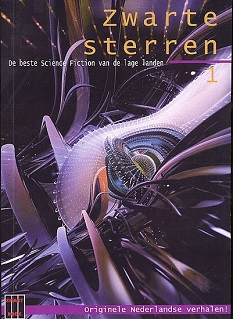
Zwarte Sterren
Roelof Goudriaan (editor)
209 pages
published in 2005
Growing up in the Netherlands I of course read a lot of science fiction in Dutch, but never read much Dutch science fiction, if only because there wasn't that much in the first place. Plenty of young adult science fiction, with Thea Beckman and the Euro 5 series being particular favourites of mine, but not many writers of grownup science fiction. Most sf publishers rather translated cheaper British or American science fiction than gamble on a Dutch or Belgian author. Better get some more Van Vogt instead.
And to a certain extend, especially once I started reading English good, there was the cultural cringe. It all seemed a bit less interesting, a bit more naff when written in Dutch. It just doesn't have the grandiosity or bombast of English and attempts to achieve the same effects usually end up sounding corny or fake. So while there were a couple of authors I liked, Wim Gijssen and especially Belgian author Eddy C. Bertin, I haven't attempted to keep up with Dutch science fiction at all.
Until the recent Worldcon that is.
And especially the Critical Diversity: Beyond Russ and Delany panel, in which the Brazilian author and critic Fabio Fernandes talked a bit about the situation in South America and how the genre had developed in his own country but was barely known outside it, how it was somewhat isolated and behind the times and it very much reminded me of how I thought about Dutch science fiction. Then of course there also was Thomas Olde Heuvelt's nomination for a Hugo, the first Dutch writer to achieve this and who managed it twice so far, which seemed to indicate that perhaps something was stirring in the Dutch sf and fantasy scene. How to find out if there was? By going to the local library of course and get some recent(ish) anthologies.
Zwarte Sterren (Black Stars was the first I got my hands on, a 2005 attempt to create an annual best of series in the tradition of the Ganymedes series published in the seventies and eighties. Like e.g. Gardner Dozois' series in English, it also has a short year overview which only shows how little Dutch sf was published a decade ago... It's the ideal way to quickly get to sample several authors and figure out which ones I want to read more of. One disappointment was that all them were men, with no female authors represented.
It was interesting to get back into reading Dutch science fiction again. I had to get used to the rhythm and cadence of the language again, as most of my Dutch reading is utilitarian rather than pleasurable. There's also the vocabulary of course, all the sf terminology that I needed to relearn from context, the way Dutch sf authors name their characters and so on. What I found was that it took me a couple of pages each story to get used to the author's voice, much more so than I need in English.
On the whole reading these stories was a pleasant experience: all were at least entertaining, though none were outstanding. What struck me was how rooted in New Wave science fiction several of them felt to me, e.g. Peter Kaptein's use of psychic powers and innerspace. You can call this oldfashioned, but it feels more like a separate evolution to me. These aren't retro stories. Rather, these writers have continued to use and develop tropes and story elements that their counterparts in Anglo-American science fiction have largely abandoned.
Of the writers included in this volume, I will keep an eye out for more work by Jaap Boekestein and Paul Evenblij/Evenby (in fact, I already have bought one of his novels). The other five had stories which were decent enough, but not good enough to seek them out on the strength of it.
Webpage created 04-09-2014, last updated 05-09-2014.